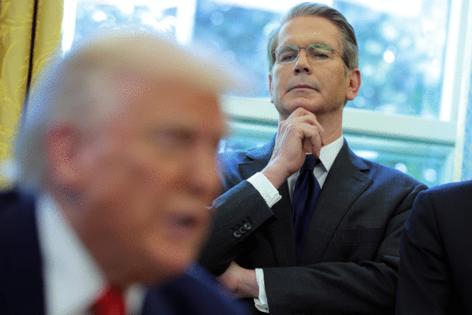Shuli Ren: Trump and Xi tone down a senseless trade war
Published in Op Eds
The U.S. and China are calling a 90-day truce in their trade war, temporarily lowering tariffs on each other from eye-wateringly high levels.
The sharp climb-down well exceeded market expectations, with investors rushing back into Hong Kong and New York-listed stocks. U.S. levies on most Chinese imports will be reduced to 30% from 145%, while the 125% Chinese duties on US goods will drop to 10%. “Neither side wants to decouple,” Treasury Secretary Scott Bessent said Monday after a weekend of negotiations in Geneva.
It’s a huge relief for small businesses and millions of workers on both sides of the Pacific. But it’s also a sign that despite their strongmen image, President Donald Trump and his counterpart Xi Jinping are not without common sense. With prohibitive levies that would essentially lead to a complete embargo, the world’s two biggest economies are hurting.
In China, while people support Xi’s hardline stance to “fight to the end” on trade, many are genuinely worried about how to make a decent living in an already weak economy. Apparel, for instance, is the third-largest category of US imports from China, after communication devices and electronic equipment. This sector happens to be labor intensive. About 16 million jobs could be at risk thanks to Trump’s tariffs, according to Goldman Sachs Group Inc. estimates.
How to help those that might fall out of work is becoming a big fiscal and social issue. The government’s unemployment insurance covers about 244 million. In the first quarter — even before Trump ignited his second trade war — payouts to the jobless rose by a whopping 22.4% to 46.5 billion yuan ($6.4 billion). In a sign of more trouble to come, the April PMI reading on new export orders plummeted to a three-year low.
Relocating these low-skilled manufacturing workers into services won’t be easy. Some of the popular gigs are already getting crowded. Last year, the number of ride-hailing drivers jumped by 27% to 38 million, while their compensation fell. In other words, China’s entire 425-million-strong blue-collar class will feel the heat regardless of whether their line of work is directly exposed to trade wars.
The future for many American workers also looks grim. For a president who boasts about creating millions of jobs, Trump is steadily destroying a healthy labor market with his maximalist approach on tariffs. In the US, small businesses account for almost 80% of job openings. Unlike big corporations such as Apple Inc., they have fewer operational levers to pull, often relying on a handful of overseas suppliers. For them, switching production to other countries such as India is an impossible ordeal. As such, if Trump’s 145% tariff lingers, they will have to lay off workers.
Of course, there’s no guarantee that this 90-day truce can hold. A mercurial Trump could change his tone at anytime, to stage manage the exceptionally tough-on-China image he fostered on the campaign trail. Meanwhile, a stubborn Xi might dig his heels in, having vowed to “never kneel down.”
But the fact that there’s an agreement of this scale after just a weekend of face-to-face talks shows that both sides want an off-ramp. Trump does seem to heed negative public opinion polls, despite calling them fake news. And Xi may not want to remind citizens of the last time he refused to budge: As the iron-fisted politician who locked down Chinese cities despite public outcries against the government’s unscientific COVID-Zero policy.
This 90-day truce is a good start.
____
This column reflects the personal views of the author and does not necessarily reflect the opinion of the editorial board or Bloomberg LP and its owners.
Shuli Ren is a Bloomberg Opinion columnist covering Asian markets. A former investment banker, she was a markets reporter for Barron’s. She is a CFA charterholder.
©2025 Bloomberg L.P. Visit bloomberg.com/opinion. Distributed by Tribune Content Agency, LLC.



























































Comments